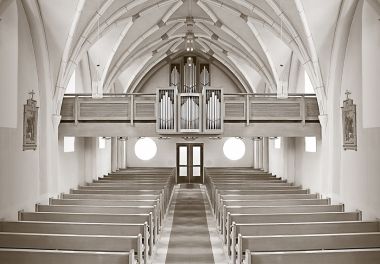Churches That Are Interdependent And Independent
It's essential to have a vision for the gospel.

That is, a godly ambition to see the gospel of Jesus Christ flourish in our day and setting. That desire for better things and better times helps drive us on in making Jesus known and serving the church with the best of our energies.
It stops us from settling for second best and becoming complacent or even negligent in our Great Commission calling.
So we serve, we plan, we invest our money, we go out, we speak up, we keep pressing forward. Why? Because we want to see people reached with the gospel, become disciples and live for the glory of Christ.
Everyone agrees on that kind of vision and the need to be active if it's to be realised. But equally we also know that to be achievable it needs to be broken down into bite-sized parts.
So, some questions for independent churches:
Does your vision include seeing the next generation of gospel workers being raised up and equipped for service in churches like yours? Would you want your next pastor to be well trained and have a genuine and tested call for such service?
Does your vision include seeing gospel workers in churches like yours being well supported, cared for and in good fellowship with others in similar positions? Would you want pastors and leaders to have some of the pastoral back-up enjoyed by those in formal denominations?
Does your vision include seeing unreached communities of Great Britain being evangelised and having their own gospel-centred churches? Would you want churches (like yours) to be encouraged in that task, and in the mission of church planting?
If the answer to those questions is 'Yes': what are you doing to make that vision a reality rather than just a godly sentiment?
Is it even possible for an Independent church to have such a vision? After all, how can a local church in the north of Scotland help a struggling pastor in Devon, or contribute to training an evangelist in Liverpool, or be assisting a church plant in Glasgow – and vice versa? It's not feasible, is it? Isn't interdependency the poor relation of a large centralised denomination when it comes to thinking big?
Well actually many independent churches who have a big vision are actively making it happen. They're involved in supporting hundreds of pastors across Britain, helping to raise up and train scores of men and women for gospel service, and enabling dozens of new church plants to become established. They do so by being part of The Fellowship of Independent Evangelical Churches (FIEC) – a family of more than 550 churches, who work in partnership to make possible what they simply couldn't do alone.
It means that an Independent church in a small community can say, 'We're contributing to the care of gospel workers; supporting church revitalisation and church planting; providing guidance and training across the nation'.
Because of their FIEC affiliation a potential women's worker is receiving financial support to go to Bible college, a sick pastor is getting care and practical help, a church plant is getting legal advice on its new constitution, and a trainee pastor is learning how independent churches govern themselves. These are just some of the ministries that simply wouldn't exist were it not for the commitment of FIEC churches to turn a big vision into concrete reality.
Of course there are other ways to express this big vision but for many independent churches it is belonging to FIEC that enables them to realise a big vision for the nation.
What about your church?
Andy Hunter @AndyHunter1967 is the Scotland Director for the Fellowship of Independent Evangelical Churches @TheFIEC and you can find out more about their work and ministry at fiec.org.uk











